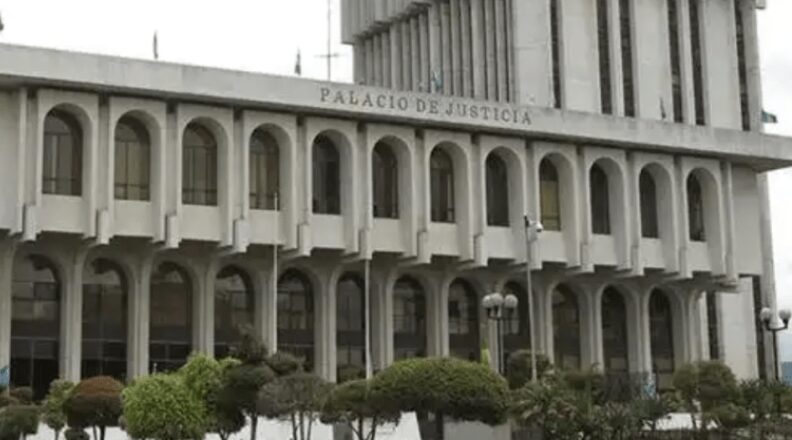Global Courant 2023-04-15 16:00:54
The general voting event scheduled for June 25 will take place, at the discretion of lawyers, with some candidates pending to be defined in an amparo ruling.
Although the first filters for the acceptance or rejection of candidacies weigh on the Registry of Citizens and the Supreme Electoral Tribunal (TSE), another key judicial instance is the Supreme Court of Justice (CSJ) and the Constitutional Court (CC).
These courts receive amparo actions that seek to concretize a registration or reverse it, and that have to carry out a procedure that could legally exceed the date of the next elections.
“The amparo is a trial, it is a process, it has stages that take time. Without going into detail about each stage, it should be noted that these steps, no matter how good will the CSJ may have, it is difficult for an amparo to be resolved in less than two or three months”, considers lawyer Édgar Ortiz, legal analyst at the Freedom and Development Foundation.
At the moment there is no official figure of how many candidacies are challenged before the Judicial Branch (OJ), since the Social Communication department of the CSJ said to ignore this information in a consolidated. However, reports handled by the political parties themselves realize that there are processes pending to be resolved for a presidential binomial and several mayoral and deputy candidacies.
The CSJ had to be renewed in October 2019, however, until now Congress has been unable to reach agreements to choose successors, which has forced the extension of the mandate of the current magistrates for three years.
Electoral issues will not be a priority
Consulted lawyers who have closely monitored this and other electoral events agree that a greater number of challenges are being observed.
“We are going to reach the elections with indefinite candidacies in some cases, but it is not the first time. In 2019, four presidential candidates fell, but the only one that had a final sentence was that of Zury Ríos, the other three did not participate due to a provisional resolution,” Ortiz explained.
Because amparo actions require a process, Francisco Quezada, from the Center for National Economic Research (Cien), considers that it is “complex” for the CSJ to resolve all actions before the vote.
“Probably everything is going to be played in the provisional protection that says whether to suspend or not, that is why in the previous process the CSJ at the end of the electoral event, had to end the files where it said that the processing is suspended, because it no longer there was material to know them, ”he said.
Much of this complexity, in the opinion of experts, is due to the fact that there is no “manual” that explains how to address or qualify specific events.
For example, Ortiz adds that to date “there are challenges for suitability, this has been a great issue. Nobody knows how the TSE qualifies the suitability, if there was a manual that said that it implies, for example, having a complaint or sentence, people would already know when they register.
The two lawyers consulted believe that it would be prudent for the CSJ to prioritize relative actions in the election process, to avoid reaching the day of the voting with undefined candidacies.
When the Department of Social Communication of the CSJ was consulted on the subject, its position was the following: “Regarding amparo and pretrial proceedings, the CSJ hears and resolves within the corresponding and established deadlines.”
Election crisis?
For Rubén Hidalgo, director of the Central American Institute for Political Studies (Incep), the background that the recent electoral event is generating can already be seen as “a crisis in the electoral system.”
Adding that “we are talking about not registering on time and not overcoming the pending processes in the judicial arena for those aspiring to participate in the voting process”, a scenario that he considers is not the best for a democratic and trusting climate.
“Among the legal potholes, the legal quagmire in which we find ourselves and which does not respond quickly, without prompt rulings, plus the changing criteria of the TSE,” Hidalgo estimates that in order to avoid these scenarios, which have already been seen in other processes Although on a smaller scale, in-depth legal reforms are required.
“These are factors that determine an electoral process and with controversial candidates, others unfairly left on the side of the road, and today we speak that we are going to have results for a candidate who wins elections, but who does not properly represent the interests of the true people of Guatemala,” he concluded.
The cases
Recently, the CSJ definitively resolved three amparo actions that confirmed the participation of two presidential pairs. These are the candidates for the political party National Unity of Hope (UNE), and the Valor-Unionista coalition.
The third case was the amparo presented by the Movement for the Liberation of the Peoples (MLP), which, by decision of the CSJ, was excluded from the electoral event by rejecting the definitive amparo.
Although the CSJ has already exhausted these injunctions, the dissenters have confirmed that they will appeal to the CC through an appeal and it is this instance that dictates the last word.
But the CSJ still has to resolve the amparo action of a couple that seeks to participate, it is the Podemos party, which seeks to register Roberto Arzú as a candidate, who has already challenged the plenary for considering them unfit. He was not registered as a result of an early campaign recidivism, according to the TSE.
The CSJ also admitted for processing, pending a decision, an amparo action with which the political party Visión con Valores (Viva), seeks to include the former president, convicted of corruption in the United States, Alfonso Portillo, as a candidate for deputy.
When speaking of councils, of those accounted for by reports from auditing entities, the amparo action filed by deputy Aldo Dávila stands out, who was not accepted by the Voluntad Oportunidad y Solidaridad (VOS) party, for keeping preliminary trials pending.
In the case of mayors, so far there are two amparo actions against the electoral participation of Neto Bran and Otto Pérez Leal, both competing for the mayoralty of Mixco.
The first is pointed out for maintaining pending pre-trial actions, and contrary to Dávila, he was registered as a candidate. Pérez Leal is credited with not meeting the legal requirements to compete for the position.







